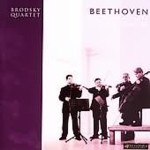Judging from this riveting release, the Brodsky Quartet evidently has deepened, refined, and personalized its collective and individual approach to Beethoven in the six years since its Op. 18 traversal for Vanguard Classics. With both repeats in tow, Op. 59 No. 2’s first movement sustains its driving momentum by virtue of the group’s linear concentration and painstaking attention to articulation and tone color, as opposed to sheer briskness. Unison lines boast degrees of clarity and specificity that make even the most polished ensembles sound generalized by comparison. Furthermore, the Brodskys generate as much tension in cross-rhythmic phrases as they do in their timing of Beethoven’s frequent silences. The long slow movement is comparable to the Tokyo Quartet’s recent Harmonia Mundi remake in terms of its brighter than usual pace. However, the impression of speed derives from the Brodskys’ acute yet never rigid rhythmic focus. They may well dispatch the finale faster than anyone else on disc, and with more lightness, control, and character at that.
It would stand to reason that the Brodsky Quartet would take Op. 59 No. 3’s Allegro molto fugue at the killer tempos the New Music Quartet and Juilliard Quartet made kosher. In fact, they hold back a bit, but the note values emerge more distinctly than usual, and the motivic interplay dances and breathes rather than dashes for the gold. And in the first movement, the Brodskys’ sparing deployment of vibrato reinforces the introduction’s inherent mystery, while the exposition and development offers a veritable master class in how to modify a basic pulse with the utmost in controlled freedom. As you may gather, not a generic moment permeates these well-thought-out, genuinely felt, and beautifully engineered performances. All Beethoven lovers should hear them. [10/9/2006]
































